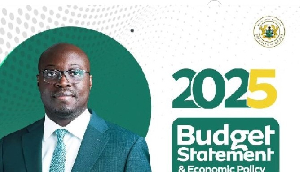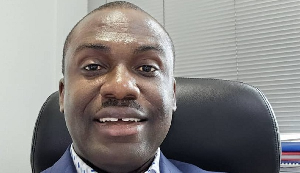The High Court in Accra presided over by Justice Anthony Opppong has accepted terms and agreement the state had entered into with three out of the six accused persons in the Ventures Capital case to pay a total of about (GH¢ 18,500,000.00) to the State.
The terms also included seizure of eleven properties belonging to the first accused persons.
This comes after Justice Anthony Oppong, a Court of Appeal Judge sitting with additional responsibility as a High Court Judge had earlier rejected an agreement reached between the Attorney General and three accused persons in the case.
The three accused persons, Daniel Duku (1st Accused), Irene Anti-Mensah (3rdAccused) and Frank Aboagye Mensah (5th Accused), entered into negotiations with the Attorney General under Section 35 of the Courts Act, 1993, (Act 459), a provision that allows accused persons to offer compensation and restitution to the State for the loss, harm or damage caused the State.
The accused persons per the agreement changed their plea from a not guilty to guilty and they were convicted on their own plea by the court.
Fines
Per the agreement reached, Mr Duku, will pay an amount of GH¢15,000,000.00) to the Venture Capital Trust Fund (VCTF) and a fine of five hundred thousand Ghana cedis (GH¢500,000.00) to the State.
Anti-Mensah is to pay GH¢1.5M to the Venture Capital Trust Fund (VCTF) and a fine of One Hundred Thousand Ghana cedis (GH¢100,000.00) to the State.
Frank Aboagye Mensah is to pay (GH¢1,195,000.00) to Venture Capital Trust Fund (VCTF) and a fine of One Hundred Thousand Ghana cedis (GH¢100,000.00) to the State.
As part of his terms, the first accused, Daniel Duku, is to forfeit about eight (8) buildings at the Agyekum Presidential Villa at Adjiringano and Georgetown Heights 6 apartments of 3 bedrooms each, and five (5) vehicles, including a Porsche Cayenne and Porsche Panamera, to the State.
The accused persons are expected to make good all the payments within three months from Friday, July 10, 2020.
Charges
Per the charge sheet of the State as presented in Court, the first accused person, Daniel Duku was charged with the offences of Wilfully causing financial loss to the Republic contrary to section 179A (3) (a) of the Criminal Offences Act, 1960, (Act 459), Stealing contrary to section 124(1) of the Criminal Offences Act, 1960 (Act 29), Money Laundering contrary to section 1(1) (c) of the Anti-Money Laundering Act, 2008, (Act 749) and Issuing of False cheque contrary to section 313A (1) (6) of the Criminal Offences Act, 1960, (Act 29).
The 3rd accused person, Irene Anti-Mensah, was charged with the offences of Abetment of crime namely Wilfully causing financial loss to the Republic contrary to sections 20(1) and 179A (3)(a) of the Criminal Offences Act, 1960, (Act 459), Abetment of crime namely defrauding by false pretence contrary to sections 20(1) and 131(1) of the Criminal Ofences Act, 1960 (Act 29) and Conspiracy to steal contrary to sections 23(1) and 124(1) of the Criminal Offences Act, 1960(Act 29).
The 5th accused person, Frank Aboagye Mensah, on the other hand was charged with the offences of Defrauding by false pretence contrary to section 131(1) of the Criminal Offences Act 1960 (Act 29), Conspiracy to steal contrary to sections 23(1) and 124 of the Criminal Offences Act 1960 (Act 29), Stealing contrary to section 124(1) of the Criminal Offences Act, 1960 (Act 29) and Money Laundering contrary to section 1(1)(c) of the Anti-Money laundering Act, 2008 (Act 749).
Facts of the case
The facts sheet of the State as presented in court by the Attorney-General states that, Venture Capital Trust Fund (VCTF) was established in 2004 by th e Venture Capital Trust Fund Act, 2004, Act 680 to provide financial support to small and medium scale enterprises (SMEs) through eligible venture capital financing companies. The 1st accused person, Daniel Duku, was the Chief Executive Officer (CEO) of VCTF between 2010 and 2015.
The 2nd accused person, Richard Lassey Agbenyefia, was a former Member of Parliament and a former member of the Board of Trustees of VCTF (the Board). The 3rd accused person, Irene Anti-Mensah, who doubled as the Executive Assistant to the 1st accused person, was an Investment Officer of VCTF.
The 4th accused person, Kofi Sarpong, was an investment officer of VCTF. The 5th accused person, Frank Aboagye Mensah, is a businessman and the husband of the 3rd accused person. The 6th accused person, Charity Opoku also known as Charity Ameyaw was an accountant at VCTF.
The 1st accused person, the facts indicates, as the CEO of VCTF, facilitated the recruitment of the 3rd and 4th accused persons, who were his work colleagues at the Ghana Investment Promotion Authority (GIPA) to join him at VCTF, as his Executive Assistant and Investment Officer respectively.
Upon assumption of office, the 1st accused person introduced a loan scheme named Development Assistance Fund (DAF) to provide credit directly to individuals and companies in clear contravention of the VCTF Act and contrary to the objects of VCTF.
Despite the advice of solicitors of VCTF on the illegality of the proposed loan scheme, the 1st accused person managed to obtain the approval of the Board for the establishment of the DAF scheme.
The 1st accused person by approval of the Board, could only approve loans not exceeding GH¢30,000. Any loan amount above GH¢30,000 was subject to Board approval. The Board also approved strict guidelines under which the loans were to be disbursed.
According to the facts, an amount of GH¢1,000,000, which was later increased to GH¢2,000,000 was approved by the Board as a revolving fund for the DAF project. Investigations have revealed that the 1st accused person disbursed various sums of money under the scheme the total of which far exceeded the approved amount of GH?2,000,000.
Prior to the appointment of 1st accused as CEO and the establishment of DAF, VCTF operated an existing scheme which gave loans to farmers in the Northern and Brong Ahafo Regions for the cultivation of sorghum.
This loan scheme known as the Special Purpose Vehicle (SPV) gave loans to certain Venture Capital Finance Companies (VCFC) namely Sinapi Aba and Techno Serve Company Limited for onward lending to farmers. The SPV had a minimum of GH¢50,000 and GH¢500,000 as the maximum amount that could be disbursed at a time to the Venture Capital Finance Companies.
This program ran successfully until the 1st accused assumed leadership in June 2010 when the project stopped.
However, in or about October 2010, the SPV was reintroduced at the instance of the 1st accused (albeit with Board approval) this time to be controlled directly from the office of the 1st accused. 1st accused could however only approve loans up to GH¢50,000.
Any loan amount above the GH¢50,000 threshold required Board approval. The facts further states that contrary to and in flagrant disregard of the approved Board thresholds for the CEO, the 1st accused person persistently approved loans purportedly under DAF and SPV well above his threshold directly to a number of companies some of which were non-existent.
Some of these fictitious companies bore addresses, which belonged to the 1st accused. The accused persons used the names of a number of companies belonging to other persons to obtain loans without the knowledge, permission and or consent of the owners of the companies.
The 6th accused, who was at all material times the accountant at VCTF and a signatory to the VCTF account, aided the 1st accused by signing blank cheques to grant loans to some of these companies while on leave. Some of the cheques were issued even before the purported applications for the loans were received.
The 1st accused, using these blank cheques signed by the 6th accused, granted loans totaling GH¢4,240,000 which resulted in a total loss of GH¢12,601,796.25 being principal and accrued interest to the Fund.
The Board, the facts noted, upon realizing the financial challenges facing the Fund in its sustainability, instructed the 1st accused in 2013 to stop the disbursement of loans under the DAF scheme and to rather concentrate on recoveries.
However, the 1st accused misled the Board by reporting that he had recovered 81% of the outstanding loans under DAF when he knew that to be false and consequently obtained the Board’s approval to resume disbursements under the DAF scheme. At the request of the 1st accused, the Board, relying on the false report of the 1st accused person, increased the DAF Fund from GH¢1,500,000 to GH¢2,000,000.
Again, in January 2015, the Board instructed the 1st accused to completely stop the disbursement of loans and focus on the recovery of loans already disbursed. These instructions were ignored by the 1st accused who authorized the disbursement of more loans without the knowledge or authority of the Board.
In June 2015, even though the appointment of the 1st accused had been terminated, he remained in office until September 2015 during which period he disbursed some more loans to companies some of which belonged to his official driver and some cronies.
During the period, the 1st accused obtained an amount of Twenty-Six thousand and Sixty-Three dollars ($26,063) to attend an official programme in the United States of America.
Even though the 1st accused did not attend the programme he failed to pay the money to chest and dishonestly appropriated the entire amount.
The Board on realizing that the 1st accused did not attend the programme, directed him to refund the Twenty-Six Thousand and Sixty-Three dollars ($26,063) to VCTF in response to which directive the 1st accused issued false cheques to VCTF, which were dishonoured upon presentation at the bank.
The 2nd accused person too obtained loans in the names of companies based on false representations to VCTF without the knowledge, permission or approval of the owners of the companies whereas in other instances the loans were obtained in the names of non-existent companies.
The 3rd and 4th accused persons, who were responsible for evaluation and processing of loan applications to VCTF, failed to conduct the requisite due diligence on loan applicants but rather facilitated the grant of loans through falsified records by entering false information on the loan application forms.
General News of Saturday, 11 July 2020
Source: kasapafmonline.com







![Isaac Kwadwo Ampong [L] and President John Mahama Isaac Kwadwo Ampong [L] and President John Mahama](https://cdn.ghanaweb.com/imagelib/pics/549/54996138.295.jpg)





